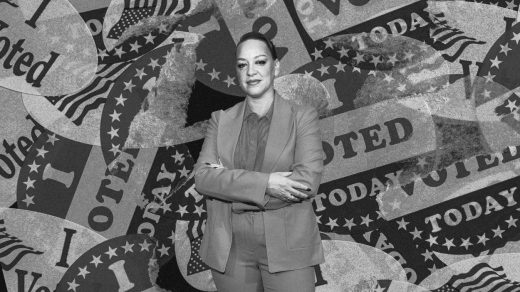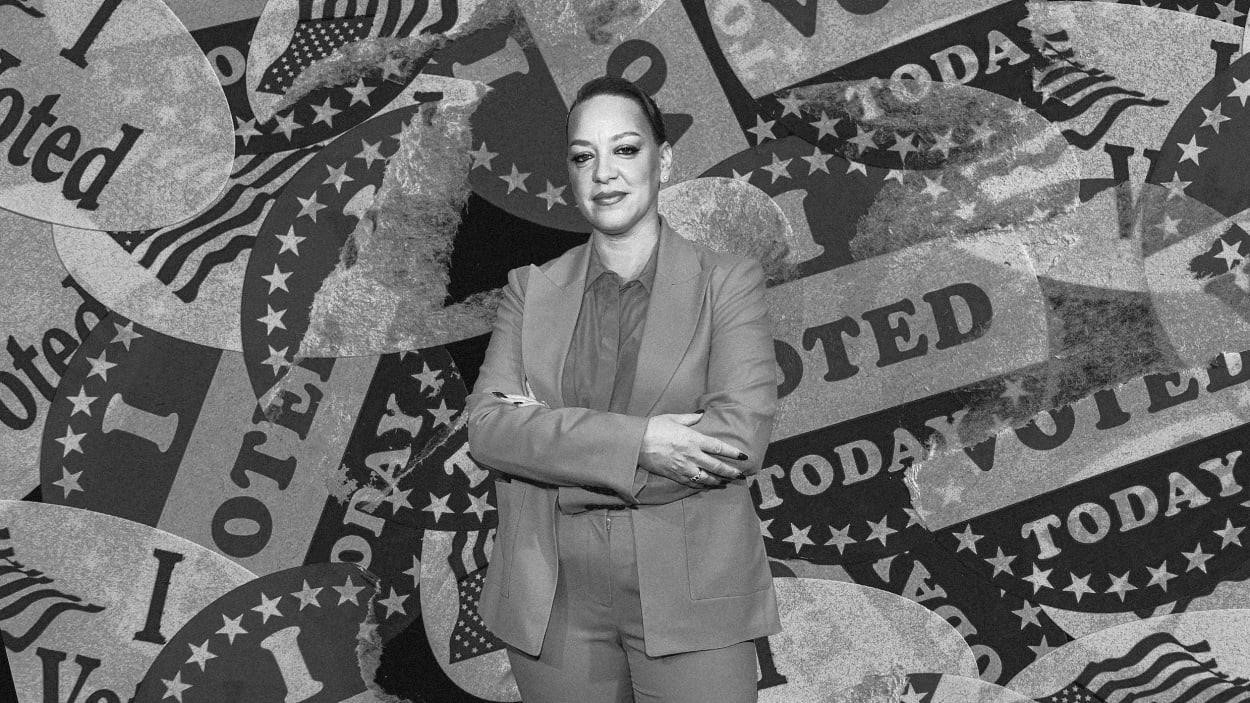This democracy activist describes her own, personal experience with voter suppression
By Mike Hofman
Like it or not, we’re now one year away from the 2024 election, which at this point promises—alarmingly—to be a referendum on the value of democracy itself. As the CEO of Vote.org, it’s Andrea Hailey’s job to closely track developments in voting access and voter suppression. Her organization’s nonpartisan mission is to help voters everywhere register to vote, and then follow up at the polls.
She and her team have been very busy lately. Thirteen states have recently enacted new laws that are meant to expand voting access and protect poll workers from harassment, according to the Brennan Center for Justice at New York University’s School of Law. At the same time, 14 states, including Florida, Texas, and Georgia, have enacted new laws that would seem to tighten restrictions on who can vote, and how. For Hailey, these issues aren’t simply abstract policy questions. Her own family has experienced voter suppression firsthand, in a confounding way. She shared her family’s experience with Fast Company.
When it comes to voter suppression, I can imagine someone making the argument that we’ve had two high turnout elections in a row: 2020 and 2022. People are voting—young people in particular—at very high levels. So, you might think voter access seems okay, and that anxiety about voter suppression is misplaced. I’m curious when and if you encounter that argument, how do you respond to it?
You do encounter that argument. And we saw that argument famously made by the Supreme Court a few years back when they said enforcement of Voting Rights Act mechanisms could be destroyed because there’s no longer any problem. Ruth Bader Ginsburg said this was “like throwing away your umbrella in a rainstorm because you are not getting wet.” She was saying these things affect people, no matter what. And so we are seeing high turnout—in spite of, not because of—the voting mechanisms that have been set up in several states in this country. We’re seeing people overcome these voter suppression laws to participate anyway.
What was voting like for you personally in the last election?
As you know, every state has a different set of laws that people have to abide by to cast their ballot. So, let’s take the example of me. In Indiana, where I live, you have to be 65 or older to cast your absentee ballot. So, while my friends in California or in Colorado could cast their ballot via mail, no problem, I could not. That’s already one hurdle. I need to go in person. So, okay, I tried to go in person in the midterm.
You tried to go?
Yes, I say “tried” because, like most Americans, I work a lot, so going in person means that I have to take time off during the day. But I’m head of Vote.org, so I’d taken the time to know where my polling location is, which is just down the street from my house in Indianapolis, and I’d made my plan to cast my ballot on the first day of early voting. But things did not work according to plan—because there was a seven-hour line at the polling location.
What did you do?
I sat in that seven-hour line for as many hours as I could, but eventually I had to leave the line, go back to work, and try again the next day. But when I went back, the same thing happened again. It took me three days of going back to try to find a time when the line was less than seven hours long. The reason that happened was because during early voting in Indianapolis, they started off by only opening five polling locations for a city that has over a million people. They know who lives in what neighborhoods and how many people might come to vote at my location. So, that’s more than just a basic planning issue. There’s a decision being made somewhere to not have additional polling locations open.
And it went beyond you to affect your whole family, correct?
Yes. I’m biracial. And it’s interesting because voter suppression cut right down the line of our family. For me, I had long lines. But my brother, who lives out in a more rural, more white area of Indiana, he was in and out of his polling location in 15 minutes. And while I have to endure hours-long lines, my parents are over 65, so they ordered their absentee ballots at the same time. My mom, who is white—hers arrived without any problem or any issue, and she turned it right back around and got it in. But my dad, who is Black—his never arrived. So he called me, his daughter, who is the head of Vote.org, and I said, okay, let me call some elections attorneys and see what we need to do. And he’s an attorney himself.
In fact, aren’t your parents civil rights attorneys?
Yes. They’re both attorneys. And between the three of us, we had a hard time figuring out, what do you need to do when your absentee ballot doesn’t arrive? Which forms do you need to fill out and where do you need to take them? We contacted an elections attorney in Indianapolis, who also took a look at it. Eventually, we pulled together all the paperwork we needed and took it to what we call the City-County Building. And when my dad turned in his forms, they said, “Oh, you must have been on the list that was lost.” And, you know, this is what we’re dealing with. The fact that my dad and I both had issues and my mom and my brother were in and out, no problem—that means that not only are voters having different experiences between every state in the United States, but we’re also having different experiences, depending on who you are, within the same state as well.
What strikes me is, this is Indiana, which as far as I know wasn’t as hotly contested as races in some other states.
Exactly. So, sometimes when I’m talking about how we need to build a democracy movement in this country, and we need to fight voter suppression, someone will say to me, “I was in and out of my location in 20 minutes. What do you mean?” And I’m like, yeah, you may have been, but please understand that we’re not all having the same experience in this country. And we are the country that put a man on the moon, so we can certainly build a process that gets the largest number of people through the polls as smoothly as possible if we want to. What we are lacking currently is the full political will to do so.
I hope people are realizing that we’re now in this moment where there are two buckets of people—those who want to see free and fair elections with every eligible voter having access to the ballot box, and those who want some other style of government. And the people who want some other style of government are funding voter suppression bills, creating all sorts of work that’s like death by a thousand paper cuts. And it’s chipping away at our democracy.
(23)



